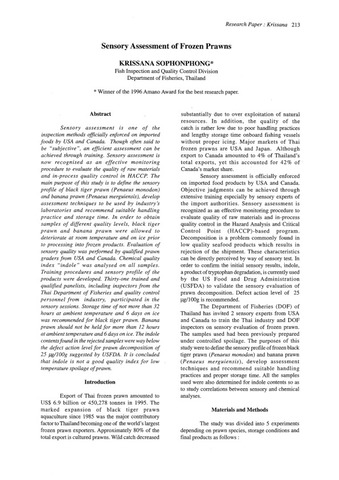| dc.contributor.author | Sophonphong, Krissana | |
| dc.contributor.editor | Hooi, Kok Kuang | |
| dc.contributor.editor | Low, Lai Kim | |
| dc.contributor.editor | Lim, Pang Yong | |
| dc.date.accessioned | 2019-05-27T09:11:49Z | |
| dc.date.available | 2019-05-27T09:11:49Z | |
| dc.date.issued | 1997 | |
| dc.identifier.citation | Sophonphong, K. (1997). Sensory assessment of frozen prawns. In K. K. Hooi, L. K. Low, & P. Y. Lim (Eds.), Proceedings of the seminar on the advances in fish processing technology in Southeast Asia in relation to quality management, Singapore, 29 October - 1 November 1996 (pp. 213-223). Singapore: Marine Fisheries Research Department, Southeast Asian Fisheries Development Center. | en |
| dc.identifier.isbn | 9810088639 | |
| dc.identifier.uri | http://hdl.handle.net/20.500.12066/4845 | |
| dc.description.abstract | Sensory assessment is one of the inspection methods officially enforced on imported foods by USA and Canada. Though often said to be "subjective", an efficient assessment can be achieved through training. Sensory assessment is now recognised as an effective monitoring procedure to evaluate the quality of raw materials and in-process quality control in HACCP. The main purpose of this study is to define the sensory profile of black tiger prawn (Penaeus monodon) and banana prawn (Penaeus merguiensis), develop assessment techniques to be used by industry s laboratories and recommend suitable handling practice and storage time. In order to obtain samples of different quality levels, black tiger prawn and banana prawn were allowed to deteriorate at room temperature and on ice prior to processing into frozen products. Evaluation of sensory quality was performed by qualified prawn graders from USA and Canada. Chemical quality index "indole" was analysed on all samples. Training procedures and sensory profile of the products were developed. Thirty-one trained and qualified panelists, including inspectors from the Thai Department of Fisheries and quality control personnel from industry, participated in the sensory sessions. Storage time of not more than 32 hours at ambient temperature and 6 days on ice was recommended for black tiger prawn. Banana prawn should not be held for more than 12 hours at ambient temperature and 6 days on ice. The indole contents found in the rejected samples were way below the defect action level for prawn decomposition of 25 µg/100g suggested by USFDA. It is concluded that indole is not a good quality index for low temperature spoilage of prawn. | en |
| dc.language.iso | en | en |
| dc.publisher | Marine Fisheries Research Department, Southeast Asian Fisheries Development Center | en |
| dc.title | Sensory assessment of frozen prawns | en |
| dc.type | Conference paper | en |
| dc.citation.spage | 213 | |
| dc.citation.epage | 223 | |
| dc.citation.conferenceTitle | Proceedings of the Seminar on the Advances in Fish Processing Technology in Southeast Asia in Relation to Quality Management, Singapore, 29 October - 1 November 1996 | en |

